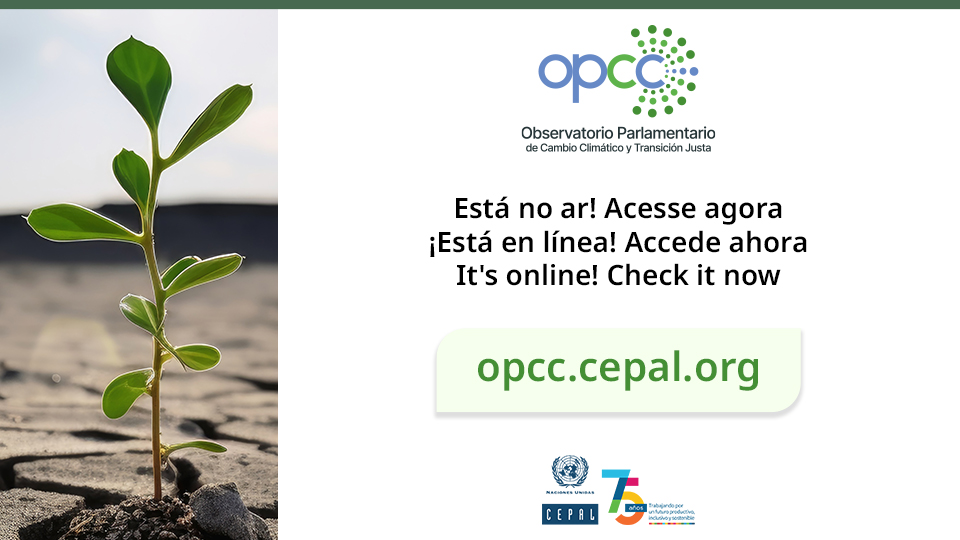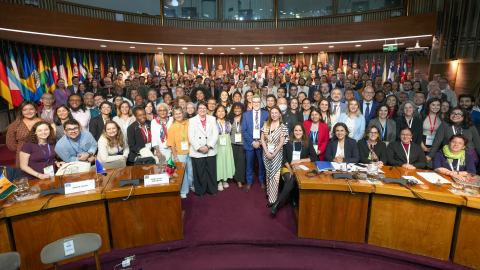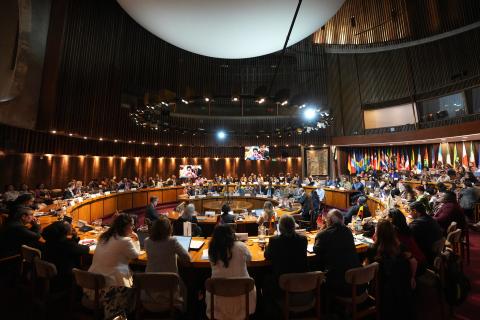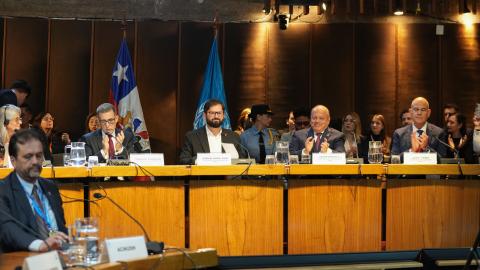Press Release
Parliamentarians from Latin America and the Caribbean launched, on September 20th, the Virtual Platform and the Legislative Data Monitor of the Parliamentary Observatory on Climate Change and Just Transition (OPCC, in the Spanish acronym).
The launch, held virtually, was organized by the United Nations Economic Comission of Latin America and the Caribbean (ECLAC) with the support of the Open Society Foundations (OSF), handled by parliamentarians from Argentina, Bolivia, Brazil, Chile, Colombia, Costa Rica, Curaçao, and Mexico. The event was opened by Senator Gladys Gonzalez, President of the Senate’s Environment Committee in Argentina as well as Iago Hairon, Senior Program Officer of Climate Justice at OSF, and Santiago Lorenzo, Head of the Climate Change Unit at ECLAC. The event was moderated by Carlos Mussi, director of the ECLAC Office in Brazil.
The OPCC is a joint initiative led by parliamentarians from several countries in Latin America and the Caribbean (LAC). Carlos Mussi explained that the OPCC aims to provide a shared tool of information on the status of legislation and parliamentary proceedings on environmental matters in the region. The director celebrated the achievement of this objective as “a great milestone of the OPCC”, emphasizing that “the Launch of the OPCC Virtual Platform and Legislative Data Tracker is the result of the collaborative work and interparliamentary cooperation of the last 12 months”.
Iago Hairon, from OSF, characterized the OPCC’s just transition perspective which consists of considering the needs of the population and reducing social inequalities, along with the recognition of the States’ essential role in promoting said transition.
Senator Gladys Gonzalez, the co-founder of the OPCC, emphasized that beyond offering transparency and information access, the platform serves is a valuable resource for environmental activists and civil society. It equips users with the means to advocate for legislations, governments to implement environmental policies, and bolster compliance to the Escazú Agreement across Latin American and Caribbean (LAC) nations. The Parliamentarians Nilto Tatto from Brazil and Kattia Cambronero from Costa Rica echoed the instrumental role of this initiative in addressing the climate crisis in LAC. They underscored the importance of prioritizing vulnerable populations in these efforts.
Wouter Schallier, head of the Hernán Santa Cruz Library and Web Services at ECLAC, presented the OPCC Virtual Platform’s functionalities. The Platform is now available at opcc.cepal.org. Users will be able to take advantage of its functionalities, such as news and relevant documents on the topic of climate change in the Latin American and Caribbean region. Within the Platform, the database called Legislative Tracker compiles over 1,100 environmental laws and 331 bills on environmental materials and climate change from 17 countries in the region.
This tool allows real-time monitoring of countries' legislative activity, with interactive and comparable graphs on economic sectors impacted by legislative instruments, among other key indicators. The OPCC Legislative Tracker innovates as it presents proposals and bills still pending approval in the parliaments. This information is crucial for monitoring the environmental and climate debate progress in the region. The website is available in Portuguese, English and Spanish. For further information, please access the Platform’s teaser video.
Following, the event featured quick analyses and results found from the data presented in the OPCC Legislative Tracker. Representative Juan Carlos Losada of the Chamber of Congress of the Republic of Colombia and Member of the Accidental Water and Biodiversity Committee, and a chair participant of the OPCC, highlighted the importance of prioritizing bills and proposals vital to legislative work across countries. Among the most recurring topics in Latin American and Caribbean environmental legislation, waste, agriculture and livestock, and mining stand out.
The OPCC Chair, Senator Cecília Requena of the Chamber of Senators of the Plurinational State of Bolivia and Second Secretary of the Land and Territory, Natural Resources and Environment Commission presented the versatility of the OPCC Legislative Tracker as it offers selected data based on a biome or ecosystem. The senator presented data on legislative activities on Amazon. The Legislative Tracker compiles 42 laws relating to the Amazon rainforest, of which 71% were approved after 2000, which indicates an increase in the level of awareness about the region only in recent decades.
Member of Parliament Gwendell Mercelina of Curaçao, also chair of the OPCC, and exponent of the Caribbean, highlighted the importance of the OPCC's virtual platform as an instrument for evaluating legislative actions and making well-informed decisions. The topic of Disaster Management is especially relevant in vulnerable territories to climate change. The countries that present the most legislation on this topic are Barbados, Costa Rica, Montserrat, and the Turks and Caicos Islands. The data presents legislative instruments that work as government responses to prevent and reduce climate disasters damages.
The event also had the participation of Senator Nancy de la Sierra, from the Senate of the Republic of Mexico, who in April of this year joined as co-chair of the OPCC. According to the senator, “the [OPCC] Observatory will be a fundamental precedent for interparliamentary cooperation and will position Latin America as a reference point for climate action”. The Mexican senator gave an informative presentation on legislation on sustainable financing in the LAC region, which usually becomes instruments and policies and include national funds, green taxes, green insurance, carbon tax or ETS, environmental services payment mechanisms, tax deductions, access to credit and financing and non-refundable subsidies. Senator Nancy concluded by presenting cases of good practices in Mexico and in Chile. Soon, the OPCC Legislative Tracker will also display climate change and just transition related legislative data of Mexico, as well as Ecuador, Panama and Paraguay.
The event was closed by Diane Quarless, Director of ECLAC's Subheadquarters for the Caribbean, who made special mention of the importance of the OPCC for the Caribbean, a subregion that suffers from vulnerabilities to climate change.
The OPCC Virtual Platform and Data Monitor is now live, and can be accessed now at opcc.cepal.org. The event recording is available at YouTube.



